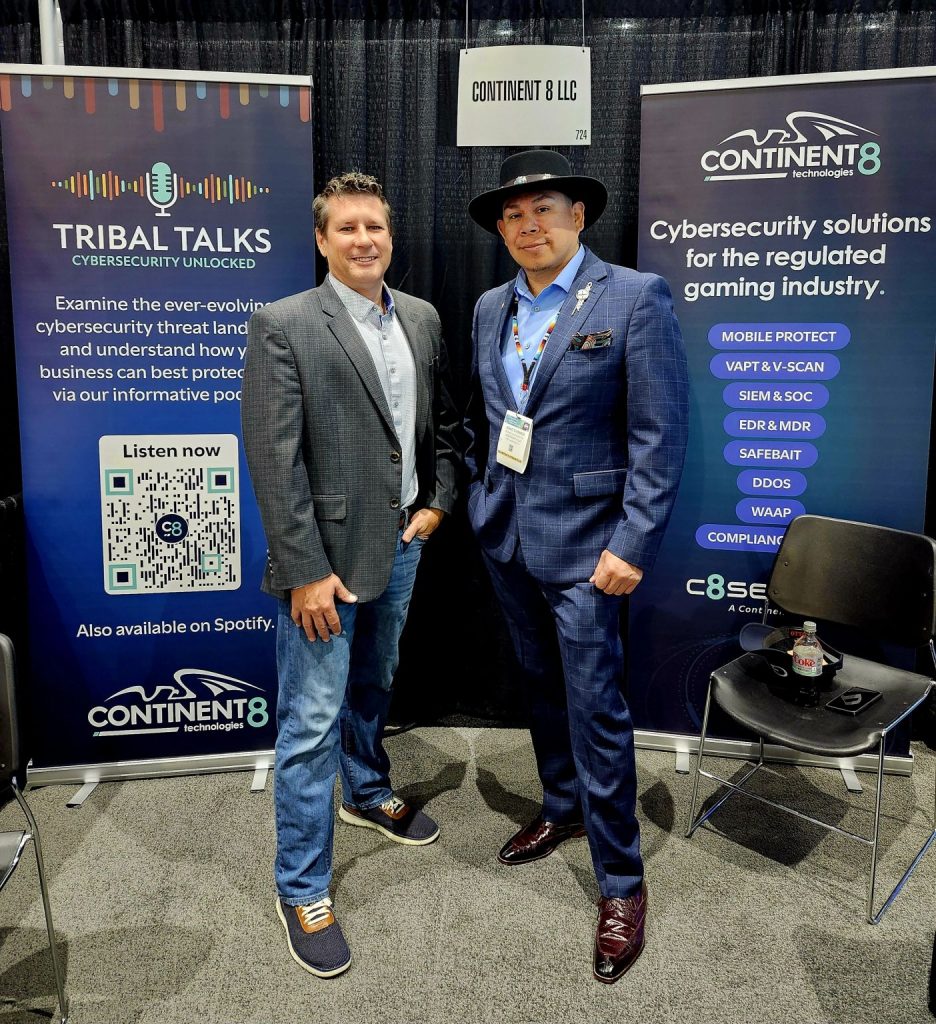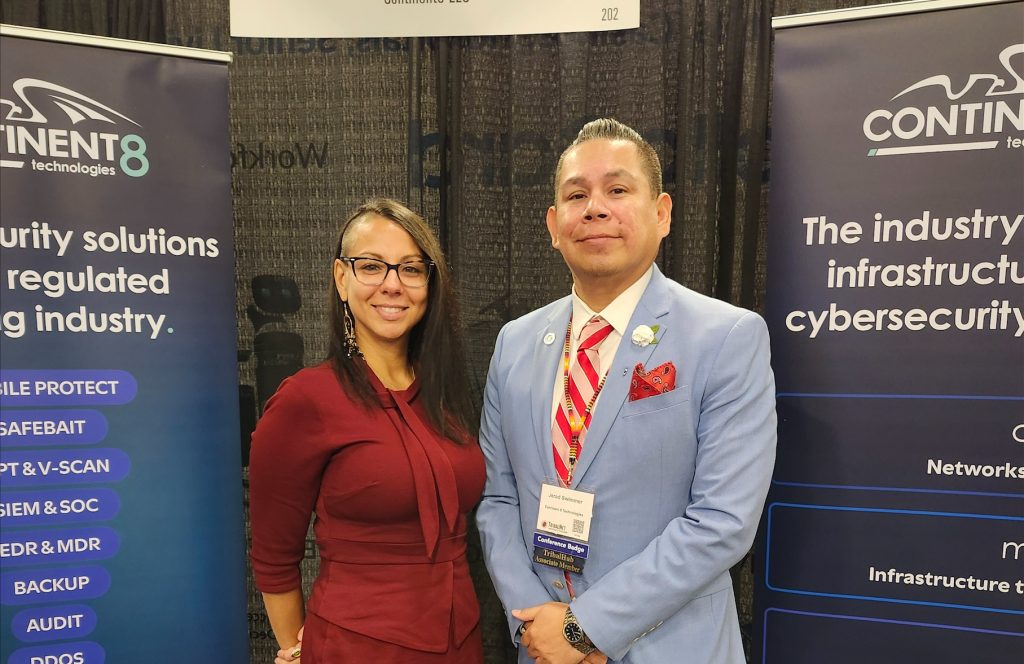
Jerad Swimmer, Regional Sales Director at Continent 8 Technologies, explores the benefits of a cybersecurity checklist to safeguard your tribal gaming operations against emerging cyber threats and attacks.

Safeguarding your business can be daunting, and you might be asking yourself ‘where do I begin?’ To address this, we have prepared a cybersecurity checklist to help you identify possible weaknesses.
First, let us set the scene with the current state of play and why you need to prioritize cybersecurity in today’s world.
The tribal gaming industry is a vibrant and vital part of many Native American communities, providing not only entertainment but also significant economic benefits. However, this industry is increasingly falling under the crosshairs of sophisticated cybercriminals. These bad actors aim to disrupt operations, steal sensitive patron data and extort ransom payments. The stakes are high, with the potential impact extending beyond the casino floors to tribal governments, health services and community trust.
Cyber threats in tribal gaming are diverse and evolving. For example, ransomware attacks have become more prevalent, demonstrating a devastating capacity to bring operations to a standstill. A recent notable incident involved a ransomware attack that compromised all internet servers and data, with the attackers demanding up to $500,000 to restore services. These incidents highlight the urgent need for comprehensive cybersecurity measures tailored to the unique environment of tribal casinos.
The consequences of a cyber attack on a tribal casino can be far-reaching. Beyond the immediate financial losses and operational disruptions, there is a profound impact on the trust and confidence of the community. Patrons expect their personal and financial information to be secure, and any breach can lead to a significant erosion of trust.
To effectively combat cyber threats, tribal casinos need to adopt a multi-faceted cybersecurity strategy. This involves not just technological solutions but also organizational practices and policies. The foundation of such a strategy includes:
Continent 8, supported by our dedicated cybersecurity company, C8 Secure, is a trusted partner for tribal nations and gaming enterprises. Our cybersecurity services are tailored to meet the unique needs of tribal governments, regulators and casino operators.
Our capabilities include:
We are trusted by a diverse array of tribal gaming casinos and organizations, including ShowNation, Tachi Palace Casino Resort, among others.
Don’t wait for an incident to discover whether you’re vulnerable. By taking these proactive steps, tribal casinos can fortify their defenses, ensuring uninterrupted operations and maintaining the trust of their communities.
Secure your tribal gaming operations by accessing this detailed checklist.
Continent 8 provides comprehensive, multi-layered threat prevention, detection and response solutions to secure your tribal organization’s digital assets in the face of evolving cyber threats. For more information on how Continent 8 can support your cybersecurity initiatives, email sales@continent.com or fill out our Contact Us page.
Continent 8 Technologies’ Regional Sales Director, Jerad Swimmer, and Principal Solutions Architect, Anthony Engel, recently attended the Indian Gaming Convention and Tradeshow (IGA) in San Diego, California.
At the event, they were showcasing Continent 8’s multi-layered cybersecurity solutions designed to support tribal casinos and their cybersecurity programs.

Anthony and Jerad at Indian Gaming Convention and Tradeshow 2025.
Here, Jerad and Anthony share their key takeaways from the show.
Anthony Engel (AE): Attending my first IGA event was an eye-opener; the scale of the venue and the number of attendees far exceeded my expectations. There was a lot of foot traffic, great content and engaging panel sessions. Overall, I was thoroughly impressed with the show.
Jerad Swimmer (JS): I’ve been going to this show for about 20-25 years, and it gets bigger and better every year. The event attracts the right mix of attendees, including tribal leaders, executives, GMs, CIOs, CEOs, CFOs, as well as vendors, manufacturers, lawyers and gaming commissions – essentially everyone involved in tribal gaming. It’s undoubtedly a must-attend event, and it’s always a privilege to be part of it.
AE: Cybersecurity remains a primary focus for most attendees. Similar to the TribalHub Cybersecurity Summit (see the show’s top takeaways blog here), participants were interested not only in Vulnerability Assessment and Penetration Testing (VAPT) but also in more advanced cybersecurity services. These included managed Security Operations Centers (MSOC) and Security Incident and Event Management (SIEM), Endpoint and Managed Detection and Response (EDR & MDR) and mobile threat prevention solutions. We actually had several customers visit our booth throughout the event, sharing their experiences with our cybersecurity services, which provided valuable real-world insights that were well received by attendees.
JS: From an engagement perspective, we noticed that attendees were more interactive, not just with Continent 8 but also with each other at our booth. It was rewarding to witness the exchange of ideas, lessons learned and future outlooks. We frequently hosted impromptu group discussions on the most pressing cybersecurity threats and the best strategies and approaches to address them.
JS: The session was well attended and highly interactive. While there were tribal leaders and operators present, the majority of attendees were directors, executive directors and IT decision-makers from tribal gaming commissions. They were keen on gathering best practices and insights on how best to implement a cybersecurity culture within their own operations and tribal governments.
A special thank you to Emra Arkansas Executive Director of the Cherokee Nation Tribal Gaming Commission, Jason Nichols, Executive Director of the Forest County Potawatomi Gaming Commission and Scott Riley, Executive Director of the Pueblo of Tesuque Gaming Commission, for making the panel session possible.

Jerad alongside Emra Arkansas, Jason Nichols and Scott Riley ahead of their cybersecurity panel session.
AE: As cyber threats continue to evolve, tribal gaming organizations must, as highlighted in Jerad’s panel session, foster a culture of cybersecurity to protect their casino and land-based operations. This ensures that all employees are working towards the same goals when it comes to cybersecurity.
For final thoughts on the IGA event, it was a fantastic experience, and I look forward to attending the event next year. It’s always a pleasure to reconnect with familiar faces and engage with those seeking Continent 8’s guidance for specific challenges or exploring our holistic cybersecurity approach.
JS: It will be interesting to observe how iGaming and online sports betting approvals progress within the tribal gaming community. Cybersecurity is also critical in these applications, and Continent 8 offers a multi-layered approach that ensures robust protection across the entire IT infrastructure, so we’re prepared to offer support across these areas as well.
Once again, we wanted to extend our gratitude to everyone who visited our booth or attended the panel session. If you missed the event and have specific challenges or need information on enhancing your cybersecurity posture, we encourage you to reach out to us anytime.
We look forward to reconnecting with everyone at IGA 2026!
Continent 8 provides comprehensive, multi-layered threat prevention, detection and response solutions to secure your tribal organization’s digital assets in the face of evolving cyber threats. For more information on how Continent 8 can support your cybersecurity initiatives, email sales@continent.com or fill out our Contact Us page.
Also, be sure to watch the latest episode in our Tribal Talks: Cybersecurity Unlocked podcast series. Each episode delves into new stories, insights gained, best practices and key developments that are shaping the future of tribal casino gaming and cybersecurity.
Watch Tribal Talks: Cybersecurity Unlocked podcast series
Continent 8 Technologies’ Regional Sales Director, Jerad Swimmer and Principal Solutions Architect, Anthony Engel, recently attended the 5th Annual TribalHub Cybersecurity Summit.
At the event, they were showcasing Continent 8’s multi-layered cybersecurity solutions designed to support tribal casinos and their cybersecurity programs.
In this blog, Jerad and Anthony share their key takeaways from the event.

Anthony and Jerad at TribalHub Cybersecurity Summit 2025.

Continent 8 – Proud members of the TribalHub community.
Anthony Engel (AE): The TribalHub Cybersecurity Summit, though smaller in scale, turned out to be an incredible event. We had the chance to engage with nearly every attendee and connect with vendors across various sectors. The event was exceptionally well organized, and its intimate setting allowed for more meaningful and impactful discussions.
Jerad Swimmer (JS): A standout feature of this event was the division of days into presentation sessions followed by an exhibitor segment. From 9:00 to 3:30, Anthony and I attended every session, which afforded us a deeper understanding of the needs and concerns of tribal organizations and how we can support them.
Adding a touch of fun to the event, TribalHub included a bingo card for attendees, encouraging them to visit each booth. Many attendees voiced that this initiative provided them with a deeper insight into Continent 8’s comprehensive threat prevention, detection and response strategies, which they might not have discovered otherwise. We are excited to continue many of these discussions beyond the event.
AE: Given the cybersecurity-focused nature of the event, attendees demonstrated advanced cybersecurity knowledge. We shared how, as a Managed Security Service Provider (MSSP), we are distinctively equipped to deliver a comprehensive cybersecurity ecosystem from a single source – ranging from DDoS protection to endpoint security, cloud protection and even mobile threat prevention. This integrated approach closes cybersecurity gaps that often arise with multiple vendors’ solutions and offers tribal gaming organizations a singular point of accountability for their entire cybersecurity framework.
JS: Indeed, as Anthony highlighted, the discussions spanned a wide array of cybersecurity techniques and strategies. In my conversations, we explored approaches to Vulnerability Assessment and Penetration Testing (see Jerad’s most recent cybersecurity blog on VAPT here), mobile endpoint protection, Security Incident and Event Management (SIEM), Security Operations Centers (SOC), Endpoint and Managed Detection and Response (EDR & MDR), as well as strategies to counter social engineering threats.
AE: From an event format perspective, as Jared mentioned earlier, we were pleased that the event organizers ensured the presentation sessions were accessible to exhibitors. This enabled us to customize our discussions around the pain points identified during these sessions and explore various strategies to address their current issues and challenges. It added an extra dimension to vendor-attendee interaction, which I believe the attendees appreciated.
JS: The summit was an exceptional platform for engaging and exchanging ideas with the tribal gaming community. Networking was a continuous all-day and all-evening affair, extending beyond the event into dinner and lounge conversations that really foster unrivalled relationship building.
Anthony and I are already looking forward to reconnecting with everyone at our next event – the Indian Gaming Tradeshow and Convention! We hope to see you there!
Visit us at the Indian Gaming Tradeshow and Convention in San Diego from March 31 to April 3 at Booth 724 to discover the benefits of 360-degree cybersecurity protection for your tribal gaming organization.
Don’t miss the panel discussion “Creating and maintaining a healthy culture in a new era of cybersecurity”, where Jerad will moderate a session with industry experts Frances Alvarez, Emra Arkansas, Jason Nichols and Scott Riley. Attendees will gain invaluable insights into data protection, regulatory practices and proactive cybersecurity strategies for tribal gaming.
Book a meeting at the Indian Gaming Tradeshow and Convention here.
Continent 8 provides comprehensive, multi-layered threat prevention, detection and response solutions to secure your tribal organization’s digital assets in the face of evolving cyber threats. For more information on how Continent 8 can support your cybersecurity initiatives, email sales@continent.com or fill out our Contact Us page.
Also, be sure to watch the latest episode in our Tribal Talks: Cybersecurity Unlocked podcast series. Each episode delves into new stories, insights gained, best practices and key developments that are shaping the future of tribal casino gaming and cybersecurity.
Watch Tribal Talks: Cybersecurity Unlocked podcast series
Jerad Swimmer, Regional Sales Director at Continent 8 Technologies, explores the benefits of Vulnerability Assessment and Penetration Testing (VAPT).

Tribal casinos are experiencing substantial financial growth. As highlighted in my previous blog, 2023 was a landmark year for the tribal gaming sector, with revenues hitting a record $41.9 billion USD, as reported by the National Indian Gaming Commission. Consequently, tribal casinos are increasingly targeted by cybercriminals, with reports suggesting a nearly 60% increase in cyber attacks on tribes in 2023.
With significant financial and personal data at stake, cybersecurity in tribal gaming and casino environments is a critical priority. But where should you start? In this blog, I’ll explain why Vulnerability Assessment and Penetration Testing (VAPT) is the perfect first step to bolster tribal gaming cybersecurity.
Let’s begin by defining VAPT. Craig Lusher, our Product Principal of Secure Solutions, describes VAPT as the following:
“VAPT is defined as a comprehensive set of cybersecurity services that helps organizations identify, assess and mitigate vulnerabilities in their IT infrastructure, applications and networks. Periodic Vulnerability Assessments (VAs) scan to detect exploitable vulnerabilities in customer networks and infrastructure and record them in a register, prioritizing remedial work and demonstrating continuous improvement. Penetration Tests (PTs) use identified vulnerabilities to further exploit and gain access, testing the efficacy of preventative security measures, procedures and technology.”
By simulating real-world cyber attacks, pentesting enables tribal casino IT and cybersecurity teams to identify system weaknesses and address potential vulnerabilities before they can be exploited by malicious actors. This strategy not only strengthens the casino environment but also ensures that cybersecurity measures remain robust and adaptable to evolving threats.
VAPT aims to establish what we at Continent 8 call a “hardened cybersecurity posture.”
A hardened cybersecurity posture integrates multiple protective layers, adhering to best practices for adaptability to threats and changes. It begins with technical controls such as network segmentation, access management and encryption, complemented by active defenses including web application and API protection, intrusion detection and cybersecurity monitoring. This approach is guided by policies and procedures for incident response and risk management.
The core components of a hardened cybersecurity posture create a robust defense system. Technical controls prevent attacks, while monitoring systems identify threats. Regular assessments are conducted to uncover vulnerabilities and governance ensures consistent implementation. This comprehensive approach ensures that even if one safeguard fails, multiple other layers remain to protect assets.
Implementing VAPT protocols is a beneficial practice for any tribal gaming organization. These measures not only bolster cybersecurity but also streamline internal and external audits.
By maintaining detailed records of testing and remediation efforts, casinos can demonstrate their commitment to cybersecurity to auditors. This transparency not only aids in passing audits but also enhances the casino’s reputation as a reliable and secure establishment.
Regular penetration testing provides tribal casinos with ongoing monitoring and enhancement of cybersecurity protocols, helping them stay ahead of potential cyber threats. This ensures a safer and more secure environment for both operations and players, while also building trust with internal and external parties and stakeholders. This proactive approach, again, is vital in preserving the casino’s integrity and reputation.
When choosing penetration testing tools for tribal casino and gaming cybersecurity, select tools that offer comprehensive coverage, capable of evaluating a wide range of vulnerabilities across multiple systems and applications.
A comprehensive VAPT service should encompass the following:
For more information on VAPT or to book a meeting with me at TribalHub Cybersecurity Summit or the Indian Game Tradeshow (Booth 18), contact me at jerad.swimmer@continent8.com.
Continent 8 provides comprehensive, multi-layered threat prevention, detection and response solutions to secure your tribal organization’s digital assets in the face of evolving cyber threats. For more information on how Continent 8 can support your cybersecurity initiatives, email sales@continent.com or fill out our Contact Us page.
Also, be sure to watch the latest episode in our Tribal Talks: Cybersecurity Unlocked podcast series – also available on Spotify – to gain a deeper understanding of the technological advancements, cybersecurity challenges and best practices shaping tribal gaming landscape.
Jerad Swimmer, Regional Sales Director at Continent 8 Technologies, explores the remarkable surge in tribal gaming revenues and its implications for cybersecurity.

The year 2023 marked a significant milestone in the tribal gaming industry, with revenues reaching an all-time high of $41.9 billion USD, according to the National Indian Gaming Commission. Advisory firm Wipfli noted that this marked the fourth consecutive year of revenue growth for tribal casinos. This remarkable growth reflects the increasing popularity and expansion of tribal casinos across the United States.
The impressive revenue figures are a testament to the hard work and innovation within the industry, highlighting the importance of tribal gaming as a vital economic driver for many tribal communities. However, with great success comes great responsibility, particularly in the realm of cybersecurity.
As tribal casinos flourish financially, they become attractive targets for cybercriminals. The surge in revenue has unfortunately been paralleled by a rise in cyber threats aimed at exploiting vulnerabilities within these establishments, with one source indicating that cyber attacks on tribes surged by almost 60% in 2023.
Cyber attacks on tribal casinos can range from data breaches to ransomware attacks, each with the potential to cause significant financial and reputational damage. The increasing sophistication of these threats demands a proactive and robust approach to cybersecurity to protect both the assets and the patrons of tribal gaming operations.
Several high-profile cybersecurity incidents have underscored the vulnerabilities within the tribal gaming sector. For instance, a tribal casino recently experienced a three-week closure due to an undisclosed cybersecurity incident. Casino officials advised previous guests to monitor their financial and credit card statements for any potential issues.
Another notable incident involved a ransomware attack that compromised all internet servers and data, with the attackers demanding up to $500,000 to restore services. These incidents highlight the critical need for enhanced cybersecurity measures to safeguard the integrity of tribal gaming enterprises.
To counter the escalating cyber threats, tribal casinos must adopt comprehensive cybersecurity strategies. This includes implementing advanced threat prevention, detection and response systems, regular security audits and continuous employee training to recognize and mitigate potential threats.
Investing in cybersecurity infrastructure, such as firewalls and mobile endpoint protection, can significantly enhance the security posture of tribal gaming operations. Collaborating with cybersecurity experts and adopting industry best practices are also pivotal steps in fortifying defenses against cyber attacks.
As cyber threats continue to evolve, tribal casinos can leverage innovative technologies and solutions to enhance their cybersecurity posture and ensure 360-degree protection. Key solutions include:
As tribal gaming continues to thrive, the critical role of cybersecurity becomes increasingly evident.
In response to the escalating threat of advanced cyber attacks targeting tribal governments and organizations, the Department of Homeland Security announced on July 1, 2024, the allocation of over $18.2 million USD in grants to 32 tribal governments. These inaugural grants, issued under the Tribal Cybersecurity Grant Program (TCGP), represent a commitment to supporting tribal communities and gaming organizations in overcoming cybersecurity challenges within their digital infrastructures and environments.
By prioritizing cybersecurity in 2025 and beyond, tribal casinos can ensure sustained growth and resilience, safeguarding their revenues and reputation in an increasingly digital world. The path forward involves a balanced approach that combines innovation and vigilance, ensuring the prosperity and longevity of the tribal gaming sector.
Continent 8 provides comprehensive, multi-layered threat prevention, detection and response solutions to secure your tribal organization’s digital assets in the face of evolving cyber threats. For more information on how Continent 8 can support your cybersecurity initiatives, email sales@continent.com or fill out our Contact Us page.
Also, be sure to watch the latest episode in our Tribal Talks: Cybersecurity Unlocked podcast series – also available on Spotify – to gain a deeper understanding of the technological advancements, cybersecurity challenges and best practices shaping tribal gaming landscape.
Continent 8 Technologies’ Regional Sales Directors, Jerad Swimmer and Jamie Garcia, and Principal Solutions Architect, Anthony Engel, recently attended the TribalNet 2024 Conference and Tradeshow.
At the booth, they were showcasing Continent 8’s multi-layered cybersecurity solutions designed to support tribal casinos and their cybersecurity programs.

Jamie Garcia and Jerad Swimmer at TribalNet 2024
Here, Jerad, Jamie and Tony share their key takeaways from the show.
Jamie Garcia (JG): Following the Oklahoma Indian Gaming Association (OIGA) 2024 event, we experienced yet another exceptionally organized and well-attended conference. It’s always a pleasure to reconnect with familiar faces, industry experts and organizational leaders, while also exploring opportunities on how we can shape, power and protect the industry together.
Jerad Swimmer (JS): Absolutely, Jamie! TribalNet was indeed a remarkable event. As one of our primary tribal-focused conferences, and a show I’ve proudly attended for many years, it provides an excellent platform for us to engage directly with new and existing customers and decision-makers who are dedicated to protecting their tribal casinos, enterprises, corporations and government organizations.
JG: Cybersecurity was a central theme at OIGA 2024, and it was front and center in most of our discussions at TribalNet as well. Artificial intelligence (AI) was a particularly prominent topic, with many attendees eager to learn about the latest trends and best practices in AI and machine learning (ML) technologies, especially in their roles for both cyber protection and cyber threats.
Tony Engel (TE): Jamie raises an excellent point about the dual nature of AI as both a tool and a threat. Cybersecurity firms are using AI to help identify risky behaviors, automate mitigation steps and assist analysts in efficient data queries. Conversely, cybercriminals are also exploiting AI and ML capabilities to launch cyber attacks – and at scale! Building robust cybersecurity programs to counter AI-driven threats can be challenging but partnering with managed security service providers (MSSPs) equipped with 24x7x365 Security Operations Centers (SOCs) and up-to-date AI, ML and threat intelligence tools and platforms is an effective strategy to combat these sophisticated threats.
JS: In addition to AI, another key focus at the event was Vulnerability Assessment & Penetration Testing (VAPT), with numerous TribalNet attendees inquiring about VAPT approaches and solutions for their organizations.
For VAPT, we advise choosing a service that can identify vulnerabilities across your entire organization, including infrastructure, networks, applications and cloud environments. A comprehensive end-to-end assessment allows you to isolate and prioritize security investments for maximum risk reduction. We also suggest regularly scheduled VAPTs to ensure a proactive and continuous evaluation and enhancement of your cyber attack surface area.

Anthony Engel and Jerad Swimmer at TribalNet 2024.
JS: As cyber threats evolve, so must our cybersecurity strategies. AI and ML will remain pivotal in cybersecurity platforms, enabling the most innovative solutions to keep the most sophisticated AI-driven threats at bay.
We also foresee the tribal gaming community continuing to expand and enhance their cybersecurity measures. We are committed to strengthening our relationships with key tribal decision makers to ensure we provide the necessary safeguards for their cyber ecosystems.
And finally, we wanted to thank all the TribalNet attendees who visited the Continent 8 booth to share their cybersecurity insights, experiences and perspectives. For those interested in continuing the discussion in person, we invite you to visit us at the Global Gaming Expo 2024 in Booth 4235 to learn more about how we can support your cybersecurity initiatives. I’m really looking forward to the event.
Book a meeting at G2E 2024: https://lp.continent8.com/g2e-vegas-2024
Continent 8 provides comprehensive, multi-layered threat prevention, detection and response solutions to secure your tribal organization’s digital assets in the face of evolving cyber threats. For more information on how Continent 8 can support your cybersecurity initiatives, email sales@continent.com or fill out our Contact Us page.
Also, be sure to watch the latest episode in our Tribal Talks: Cybersecurity Unlocked podcast series. In this episode, Jerad Swimmer talks with Anthony Engel about cybersecurity challenges in the age of modern AI as cyber threats become increasingly sophisticated.

Explore the critical cybersecurity measures and considerations necessary for safeguarding tribal casino gaming enterprises in an increasingly digital world.
In this blog, Jerad Swimmer, Regional Sales Director at Continent 8 Technologies, discusses the range cyber threats confronting tribal casinos, highlights the most recent cyber attacks on these establishments, outlines the unique specific cybersecurity requirements of tribal gaming and recommends best practices for establishing robust cybersecurity measures to improve their overall cybersecurity posture.
Tribal casinos are increasingly becoming targets for cyber attacks, with hackers constantly looking for vulnerabilities to exploit. Some of the current cyber threats facing tribal casinos include:
To protect against these threats, tribal casinos need to implement robust cybersecurity measures and stay up to date with the latest security practices.

There have been several tribal casino incidents recently where casinos have been forced to close following a cyber attack.
Cyber attacks are on the rise and tribal casinos must take these threats seriously to properly safeguard their operations.
Tribal gaming operations have unique cybersecurity needs that must be addressed to ensure data protection and operational continuity. These needs include:
By understanding these unique cybersecurity needs, tribal casinos can develop effective strategies to mitigate risks and safeguard their operations.
To enhance cybersecurity in tribal gaming operations, the following best practices should be implemented:
By implementing these best practices, tribal casinos can significantly enhance their cybersecurity posture and protect against a wide range of threats.
As cyber threats continue to evolve, tribal casinos can leverage innovative technologies and solutions to enhance their cybersecurity posture. Some key technologies and solutions include:
By embracing these innovative technologies and solutions, tribal casinos can stay ahead of cyber threats and enhance their overall cybersecurity posture.
Learn more about Continent 8’s multi-layered cybersecurity solutions at the Oklahoma Indian Gaming Association (OIGA) Conference and Trade Show in Oklahoma City ‘the biggest little show in Indian Gaming’, from August 12-14.
Continent 8’s Regional Sales Directors, Jerad Swimmer and Jamie Garcia, and Principal Solutions Architect, Tony Engel, will be in attendance at Continent 8 stand 1033.
To set up a meeting, visit here.